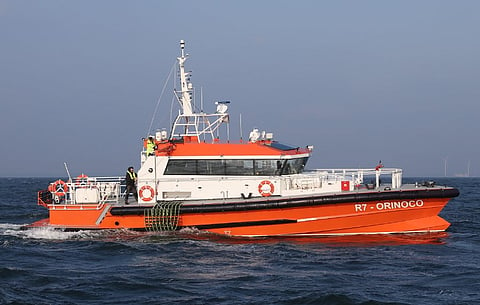

Over recent years Estonia-based Baltic Workboats has become globally renowned for its strong, safe, efficient, attractive and economical work, pilot SAR and patrol boats.
They have been exported widely and that is a very good sign. This particularly impressive and attractive 20 metre aluminium SAR boat was recently delivered to the Belgian Sea Rescue organisation for service in the often gloomy, cold and rough North Sea. Its self-righting capability will reassure its crews.
"The boat is specifically designed to perform SAR in the harsh conditions of the North Sea," Rimo Timm, Baltic Workboats' Head of Sales, told Baird Maritime. "It has a prominent wave-piercing hull that reduces vertical accelerations in heavy seas by as much as 40 per cent, which translates into safer working conditions for the crew and greater convenience for rescued survivors."
The boat also features many custom solutions to aid in recovering people from the water such as rescue davits with nets on both sides of the vessel, a lowered aft deck area, and a hydraulically operated aft platform and designated helicopter winching area. In addition, the vessel features waterjet propulsion and a bow thruster to guarantee precise manoeuvring and position keeping when assisting vessels and people in distress situations under the most challenging conditions.
"The operation of the vessel is made highly convenient for the crew. The main helm station in the wheelhouse features numerous automated and integrated control and monitoring functions with Baltic Workboats' in-house developed integrated alarm, monitoring and control system (IAMCS). This allows the captain to have direct control over the main and auxiliary systems. The captain also has the main propulsion controls integrated into the seat armrests to guarantee seamless manoeuvring.
There is an additional control station outside the wheelhouse on the aft deck to provide the crew with the best possible situational awareness under all conditions. The vessel also features an indoor area for rescued survivors with seating for up to 20 people and space for five stretchers.
"The Covid pandemic caused some supply chain disruptions and made the customer's shipyard visits a bit challenging at times," said Timm. "However, we managed to perform quality checks and submit building process reports remotely, thus guaranteeing that construction stayed on schedule and that the vessel was delivered on time. Furthermore, the communication of precise design solutions with the customer proved productive, and we benefited from this cooperation for the duration of the project."
For Timm, shipbuilding is partly being driven by the requirement for emissions reductions, environmental friendliness, and multi-functionality so that vessels would be suitable for various tasks. Companies are also constantly studying alternative propulsion solutions.
"In addition to working on electric-hybrid vessels, we have just entered into separate agreements for an Estonian State Fleet multi-purpose workboat that will run mainly on biomethane and for a Belgian fully electric ferry that should also be methanol-ready," he told Baird Maritime. "Thus, we clearly see that customers are also thinking ahead and want to be ready to implement the latest technologies on board as soon as they are ready for industrial scale production.
Timm added that there is a surge in interest and development of unmanned or lean-manned platforms and that Baltic Workboats is also heavily involved in such projects. A notable example of this is the EDF Euroguard project, where Baltic Workboats is a consortium leader and the objective is the introduction of a semi-autonomous modular naval platform by the end of 2027.
